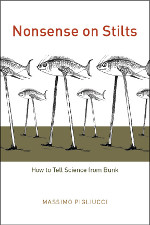Why do people believe bunk?

Last week, Andrew Wakefield, the doctor whose research suggested a link between the childhood MMR vaccine and autism, was banned from practicing medicine in the United Kingdom. The New York Times reports: “The disciplinary tribunal’s action came after more than a decade of controversy over the links Dr. Wakefield and associates in Britain, as well as supporters among parents of some autistic children in Britain and the United States, have made between autism and a commonly used vaccine for measles, mumps and rubella. The suggestion of a link caused use of the vaccine in Britain and elsewhere in the world to plummet, a development that critics of Dr. Wakefield said contributed to a sharp rise in measles cases in countries where the vaccine was in use. Most scientific papers have failed to find any links between vaccines and autism.”
Though the move was hailed by many as a victory of science over pseudoscience, some wonder if it is too little too late. Opines the Boston Globe: “But sadder still is the possibility that, in the minds of thousands of parents desperately clinging to hopes of finding a cure for autism, Wakefield’s legend might survive untarnished, possibly even exalted.”
Why, even after Wakefield has been disbarred and his work discounted, do some people still believe him? And more generally, why do people hold tight to their fringe beliefs?
These are the questions that Massimo Pigliucci sets out to answer in his new book Nonsense on Stilts: How to Tell Science from Bunk. Presenting case studies on a number of controversial topics—from AIDS denialism to vaccines to creationism to global warming—Pigliucci cuts through the ambiguity surrounding science to look more closely at how science is conducted, how it is disseminated, how it is interpreted, and what it means to our society. The result is in many ways a “taxonomy of bunk” that explores the intersection of science and culture at large.
Pigliucci and his book have been everywhere lately. Recently, New Scientist praised Pigliucci’s work as a “brilliant book, which ought to be required reading for, well, everyone.” Pigliucci was a guest this morning on The Brian Lehrer Show on WNYC (listen to the audio recording here) and was interviewed on KERA’s program Think this afternoon (audio will be posted here). He’s also been making rounds of the podcasts, appearing recent on Skeptically Speaking and The Skeptic’s Guide to the Universe. And, if you still can’t get enough, you can always check out his own blog, Rationally Speaking.